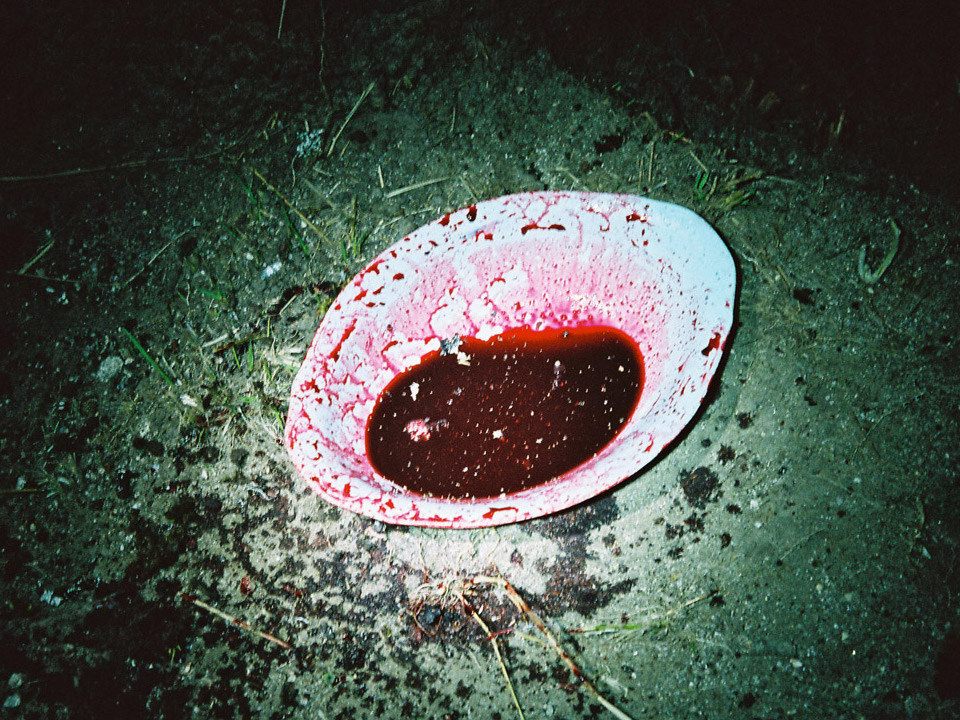
Vampire is a dreamlike journey in search of Nok Phii, a strange mythical bird that feeds itself on the blood of other animals.
EN
“Somewhere along the border of Thailand and Burma lives a creature called Nok Phii (Ghost Bird). Or there used to live one. If it exists, apart from the Vampire Finch of the Galápagos Islands, Nok Phii would be the only species of bird that feeds on other animals’ blood. In several of the local tales, Nok Phii is portrayed as an aggressive nocturnal predator. In some stories, it even attacks human. In 2007, a sighting of a male and female Nok Phii in a remote mountain was reported by the villagers in the north of Thailand. There was a speculation that this was the only pair left in the world. This supposedly small with large eyes bird has never been captured, dead or alive. There are no remains. Without concrete evidence, this rare bird might only be an imaginary animal associated with alluring danger and mythical aura. Vampire is a dream of the strange avian and its habitat, an impression of a voyage to capture this unusual treasure on film.”
Apichatpong Weerasethakul1
Andrea Lissoni: I like the couple Vampire and M Hotel. On one hand they deal with two crucial visual obsessions of you, respectively artificial light and windows, on the other one, there is that permanent interest – I would not call it an obsession – for animals and men. What do you think about?
Apichatpong Weerasethakul: I like the settings where the lights and desire cross path. The desire to communicate with the invisibles in the darkness, or in memory, or in the future. It's always related to cinema and we as insects that are drawn to lights.
It’s actually a couple of thriller short films?
Perhaps yes. I always love American B-horror movies since I was young.
I was wondering how do you react to commissions? You take it as an occasion to develop something you always had in mind or it’s more a question of improvisation?
I can always find something in the commission’s guidelines. But most of the time I chose the locations that always relate to my memories and I focus on that.
About Vampire: Can you tell us a little bit about the making of Vampire? Watching it I felt something like a playful mood in the beginning, even if the subtitles are speaking about something very serious related to some political issues (the country and the burmese soldiers ...).
It’s a game... of faking mystery, of filmmaking, of politics. I just finished reading a book on North Korea. These authoritarian regimes are playing the games of murder and deception. There is also the element of beliefs, which is also there in Vampire.
Apichatpong Weerasethakul in conversation with Andrea Lissoni2
“This effect of the vampire’s kiss goes backward, it gives a breath of life, at the very threshold before all stories, all visibilities disappear. It is cold there, very cold. With Apichatpong, we feel temperature as well as colours and sounds, the sensuality of his cinema exceeds the usual audiovisual boundaries to generate a total sensorial experience. The camera caresses a naked torso; a hand touches a blood-spattered back, like a ceremonial act, a game, a daub, and a primitive technique, all at once. But what is being hunted here? The pair of brown sparrows, barely glimpsed at the end before they take flight? Or perhaps the more certain yet intangible vampires which we usually call beauty and mystery? Has Apichatpong’s cinema, from his Mysterious Object at Noon to these winged creatures in the depths of the night, ever searched for anything else? They prowl; they are here. To catch them would be to kill them, and perhaps also die in the process.
His films are approach marches, bewitching dances towards a prey that you should never, ever capture. A predatory prey for which you need all your wits, to sense it, lest you merge into it, at your own peril. We know this somnambulistic elaboration of a multidimensional world thanks to the floating interaction between human body, wild nature environment, and mythological presence. We know it because we have been granted the encounter with a masterpiece of the early 21st Century, Tropical Malady. The process is similar in Vampire though the spirit is slightly different: instead of the gigantic mystic tiger that haunted the jungle and the soldier’s mind till the moment they might merge into a supernatural entity, the deliberate triviality of the birds’ visualization conveys a certain shamanist lightness. This side of the work echoes a more intense social implication with the haunting reference to the impoverishment of the area and the hate between poor peasants and poor immigrants. Instead of the infinite but intimate pain of a broken love, as in Tropical Malady, it is in the darkness of collective fears and griefs that this minimalist, therefore essential experience of cinema, plunges into.”
Jean-Michel Frodon3
- 1Apichatpong Weerasethakul, “Filmmaker’s Statement,” Kick the Machine.
- 2Andrea Lissoni, “Apichatpong Weerasethakul ‘Vampire/Sud Vikal – M Hotel’,” Vdrome.
- 3Jean-Michel Frodon, “Hunting the Invisible,” in Apichatpong Weerasethakul, ed. James Quandt. (Vienna: FilmmuseumSynemaPublikationen, 2009), 242-243.

